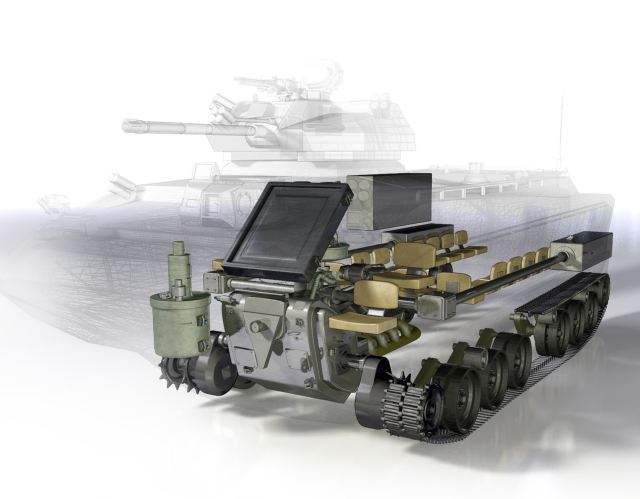Breaking news
U.S. DARPA awarded price for Fast Adaptable Next-Generation Ground Vehicle FANG 2704133.
| a | |||
Defence & Security News - United States |
|||
| |
|||
| Saturday, April 27, 2013 11:26 AM | |||
| U.S. DARPA awarded price for Fast Adaptable Next-Generation Ground Vehicle FANG. | |||
The Defense Advanced Research Projects Agency (DARPA) of United States
awarded a $1 million prize to “Ground Systems”, a 3-person
team with members in Ohio, Texas and California, as the winner of the
Fast Adaptable Next-Generation Ground Vehicle (FANG)
Mobility/Drivetrain Challenge. Team Ground Systems’ final design
submission received the highest score when measured against the established
requirements for system performance and manufacturability. |
|||
 The Fast Adaptable Next-Generation Ground Vehicle (FANG) program seeks to develop the infrastructure for and conduct a series of design challenges intended to precipitate open source design for a next-generation infantry fighting vehicle. |
|||
| “I’m very pleased with the quality of the submissions we received during the challenge, and we have learned a great deal throughout the process,” said Army Lt. Col. Nathan Wiedenman, DARPA program manager. “The first FANG Challenge has been a great experiment, and the submission of many viable, innovative designs has validated the Adaptive Vehicle Make (AVM) design tools and provided invaluable feedback to continue their development.” Wiedenman noted that several different types of teams were able to use various aspects of the tools to create viable designs in the course of the challenge. The winning team, for example, was geographically separated, but was able to use the collaboration tools to create the winning design. Another finalist team was comprised of people who met through VehicleFORGE, the online collaboration platform used by competitors to manage and submit their designs. Still another top design was submitted by a one-person team. In many cases, a traditional design process would likely have excluded these teams from contributing their ideas. Since the beginning of the first FANG Challenge on January 14, 2013, more than 1,000 participants within more than 200 teams used the META design tools and the VehicleFORGE collaboration platform developed by Vanderbilt University in Nashville, Tenn., to design and simulate the performance of thousands of potential mobility and drivetrain subsystems. The goal of the FANG program is to test the specially developed META design tools, model libraries and the VehicleFORGE platform, which were created to significantly compress the design-to-production time of a complex defense system. Now that the design challenge has concluded, the winning FANG design will be built by the DARPA iFAB program team. iFAB, or Instant Foundry Adaptive through Bits, is led by the Applied Research Laboratory at Penn State University and will validate the manufacturability feedback, foundry configuration, and instruction generation tools as part of the build process. Ultimately, the as-built design will be subjected to test and evaluation under the leadership of the FANG performer, Ricardo Inc. of Van Buren Township, Mich. Begun in 2010 as part of DARPA’s advanced manufacturing initiative, AVM is a portfolio of programs focused on the reduction of complex military system development timelines by a factor of five or more. The technical approach encompasses multiple efforts addressing all aspects of the manufacturing process, from requirements representation, through design, to final physical build of a full-scale complex defense system. |
|||



















